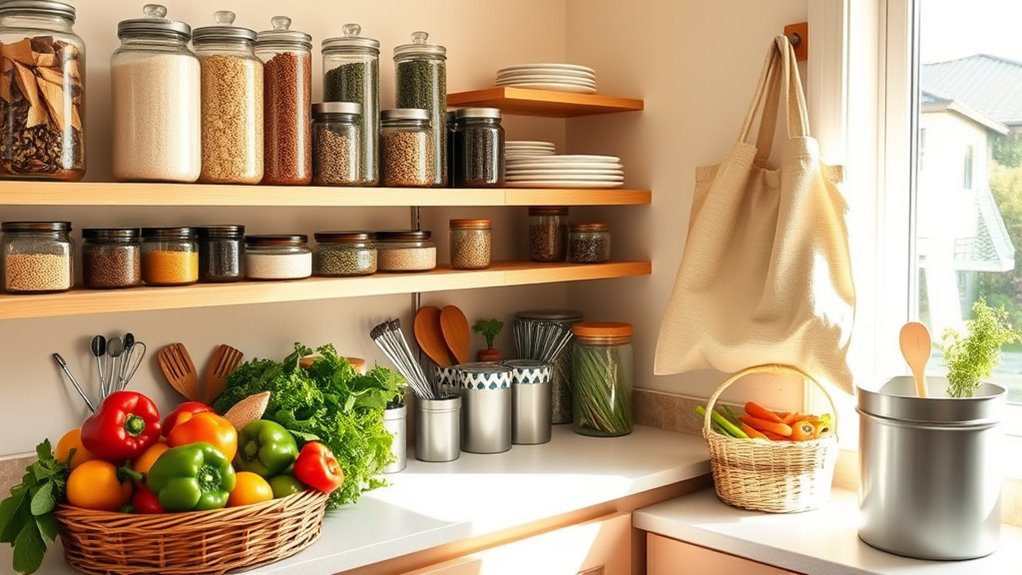To start a zero-waste lifestyle, focus on reducing waste from the beginning by choosing sustainable packaging and reusable items. Learn proper recycling techniques to guarantee your materials are sorted correctly and avoid contamination. Reuse and repurpose items like jars and boxes to cut down on new waste. Building awareness and forming sustainable habits makes a big impact over time. Keep exploring these strategies to deepen your understanding and make meaningful changes.
Key Takeaways
- Start by reducing packaging and choosing products with minimal or sustainable materials.
- Reuse and repurpose items like jars, containers, and boxes to extend their life.
- Master proper recycling techniques to ensure recyclables are correctly sorted and contamination is minimized.
- Adopt conscious purchasing habits, favoring bulk, recyclable, or biodegradable packaging options.
- Build awareness through education, community involvement, and consistent small actions for lasting impact.

Have you ever wondered how small changes can make a big difference for the planet? Embracing a zero-waste lifestyle starts with understanding that your everyday choices matter. One of the most effective ways to begin is by mastering recycling techniques. Instead of tossing everything into the trash, you can learn how to sort your waste properly, ensuring recyclables like paper, plastic, glass, and metal go to the right places. Proper recycling reduces landfill overflow and conserves natural resources. But recycling alone isn’t enough; it’s equally important to focus on reducing waste from the start. This means opting for sustainable packaging whenever possible. Instead of single-use plastics, choose products wrapped in biodegradable or reusable materials. Carry your own containers, use beeswax wraps, and say no to excessive packaging at checkout. These small adjustments markedly cut down on waste and lessen the burden on landfills.
Small changes like proper recycling and sustainable packaging can significantly reduce waste and protect the planet.
Once you’re comfortable with recycling techniques, it’s time to rethink your purchasing habits. Seek out products with minimal packaging or those that come in sustainable packaging options. When shopping, prioritize bulk sections or items in compostable or recyclable packaging. This prevents unnecessary waste and encourages companies to adopt more eco-friendly practices. Over time, these conscious decisions become second nature, transforming your approach to consumption. Additionally, cultivating an awareness of waste management can help you understand how different materials are processed and help you make more informed choices. Gaining a clear understanding of proper sorting can significantly improve the efficiency of recycling efforts and reduce contamination of recyclable materials. Engaging with community programs can also provide valuable insights into local waste reduction initiatives and best practices.
Another critical step is cultivating a habit of reusing and repurposing. Instead of discarding items after a single use, get creative with how you repurpose things around your home. Glass jars can store pantry staples, old t-shirts can become cleaning cloths, and cardboard boxes can turn into storage solutions. Reusing reduces demand for new products and keeps waste out of the landfill. When you do need to buy new items, look for durable, long-lasting options that won’t need frequent replacement. This minimizes waste in the long run. Developing a mindset of intentional consumption helps you prioritize quality over quantity and reduces impulsive purchases.
Building awareness around waste production helps reinforce your commitment. Educate yourself on waste reduction techniques, stay updated on sustainable packaging innovations, and participate in local recycling programs. The more informed you are, the easier it becomes to make choices aligned with your zero-waste goals. Additionally, understanding the importance of proper recycling can motivate you to enhance your sorting skills and ensure materials are processed correctly. The more informed you are, the easier it becomes to make choices aligned with your zero-waste goals. Remember, small consistent efforts add up — each recycled item, each piece of sustainable packaging, and each reused object makes a tangible impact. Over time, these habits become second nature, and you’ll find yourself living more intentionally, reducing your ecological footprint and inspiring others to do the same. The journey toward zero waste isn’t about perfection; it’s about progress. Every step counts, and your efforts contribute to a healthier planet for future generations.
Frequently Asked Questions
How Can I Start a Zero-Waste Lifestyle With a Tight Budget?
If you’re starting a zero-waste lifestyle on a tight budget, focus on budget-friendly swaps like reusable bags, containers, and cloths instead of disposables. You can also try DIY zero waste tips, such as making your own cleaning products or beeswax wraps, to save money. These simple changes don’t require big investments and help reduce waste, making it easier to adopt a sustainable lifestyle without breaking the bank.
What Are Common Challenges Faced When Adopting Zero Waste?
Overcoming resistance feels like battling a mountain of habits, but it’s doable. You’ll face challenges like managing expectations and breaking old routines. It’s common to feel overwhelmed or discouraged, but persistence is key. Remember, change takes time, and setbacks are part of the journey. Stay committed, stay positive, and keep your goal in sight. With patience, you’ll transform your habits and embrace a more sustainable lifestyle.
How Do I Handle Zero Waste While Traveling?
When traveling zero waste, you should bring reusable containers for snacks and drinks, making it easy to avoid single-use plastics. Pack eco-friendly toiletries in refillable bottles to reduce waste and stay eco-conscious on the go. Research eco-friendly options at your destination, and opt for local, sustainable products whenever possible. Planning ahead helps you stay aligned with your zero waste goals, even while exploring new places.
Can Zero Waste Be Practiced in Small Apartments?
You can definitely practice zero waste in small apartments. Focus on composting methods like worm bins or bokashi to reduce kitchen waste. Prioritize bulk shopping to cut down on packaging and carry reusable bags and containers. Small space doesn’t mean sacrificing sustainability—opt for minimal packaging, reusable items, and smart storage solutions. Every small effort adds up, helping you live more sustainably even in limited space.
What Products Are Essential for Beginners?
Thinking you need a million gadgets to start zero waste? Nope! Just grab a few essentials like reusable containers and compostable utensils. These simple swaps make a big difference and fit easily into any space, even a tiny apartment. No fancy tools required—just a commitment to reduce waste daily. Start small, stay consistent, and watch how these basic items transform your habits and help the planet.
Conclusion
Embracing a zero-waste lifestyle is like planting seeds in your daily routines, nurturing growth with mindful choices. Each small step becomes a ripple, spreading change beyond yourself—like a drop in an endless ocean. As you shed excess, you uncover clarity and purpose, forging a path toward sustainability. Remember, your journey isn’t just about waste; it’s about cultivating hope, resilience, and a future where harmony blooms from your committed actions. Keep tending your garden of change.









